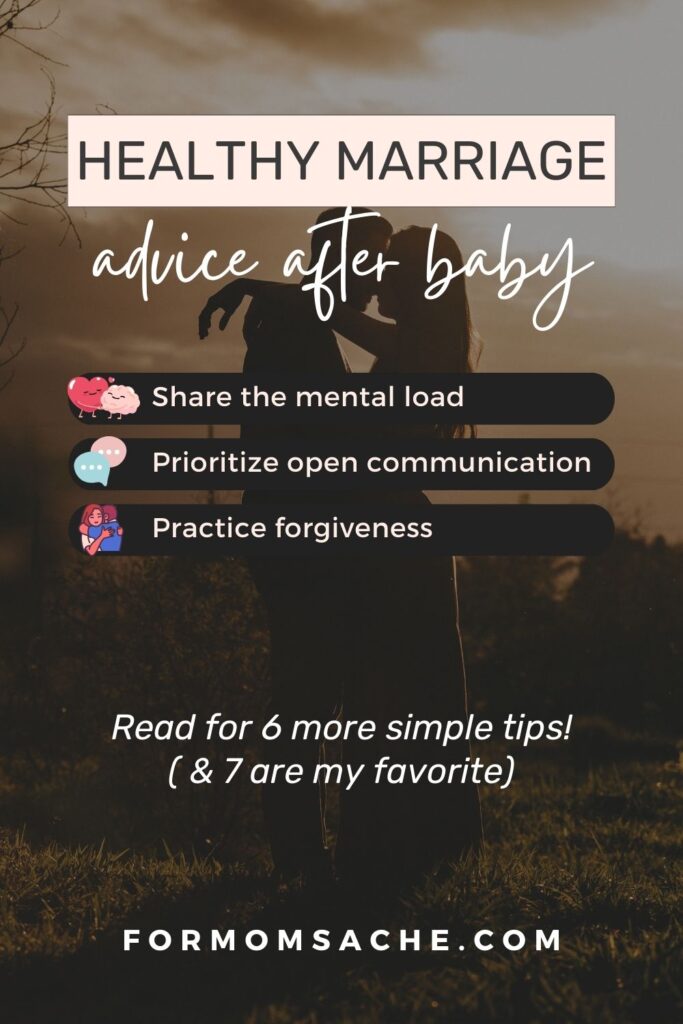
Parenthood can be equal parts joy and chaos. Your little ones are undeniably cute, but let’s face it—kids are also tiny agents of destruction (of sleep, routine, and sometimes sanity).
Adding to the demands of raising children, marriage can quickly become sidelined, leaving you wondering where your partner and the spark went.
When all is said and done, it sometimes seems there’s no fix for the disconnect and the divide you experience. However, there is good news. You can maintain a healthy marriage after having kids.

The key to keeping a relationship strong after a baby is to remember that it’s not always about grand gestures or picture-perfect moments but small, consistent efforts that nurture love, respect, and partnership. This guide contains 9 actionable strategies to help keep your bond with your partner alive and thriving. Let’s get to it!
9 Strategies for a Healthy Marriage After Kids

Share the Mental and Physical Load
How dividing parenting and household duties keeps resentment at bay.
One of the many struggles of motherhood is feeling overwhelmed by the volume of daily tasks. Many moms also struggle with the uneven distribution of tasks in and around the home.
An uneven distribution of responsibilities can breed resentment faster than a toddler throwing tantrums in Target. Nothing strains a marriage like resentment, leaving no room for understanding, compassion, or forgiveness.
Practical Solutions for a Balanced Partnership
- Teamwork Audit: List all tasks, both seen (cooking) and unseen (remembering the school meeting). Split them in a way that feels fair.
- Tag-You’re-It Approach: Rotate duties weekly to keep things fresh. Or maximize whatever chore you both prefer. For example, you may choose to clean while your partner prefers to do laundry; no need to be stuck doing something you don’t like.
- Use a Calendar: Create a monthly calendar with all the appointments and important dates to remember (school meetings, doctor’s appointments, etc.) and put it somewhere that gets regular traffic. This is an additional tool to share responsibilities as a daily reminder after verbally mentioning said responsibilities.
Turn chaos into clarity—grab the Neatsure Acrylic Magnetic Dry Erase Board Calendar on Amazon today!

Key Takeaway: Sharing the load isn’t just practical—it’s an act of love and a way for you both to connect.
Prioritize Open and Honest Communication
Healthy communication tips for parents juggling marriage and kids.
Your marriage is going through the surviving parenthood phase of figuring out routines and getting everyone through the days fed and, mostly, clean. Where does the time for deep, meaningful conversations come in?
In fact, taking some time to think about the last time you and your partner spoke about something other than groceries, diaper brands, or school projects might leave you feeling stumped.
Communication is the lifeblood of any healthy relationship, but it often takes a backseat in the whirlwind of parenting. The first thing to note is that, though dismal, this happens more often than you might think.
How to Improve Communication Post-Kids
- Schedule “Talk Time”: Set aside at least 15 minutes daily to check in with each other. Keep it kid-free and make it solely about the both of you!
- Active Listening Matters: Put down the phone, maintain eye contact, and consciously engage in what your partner shares.
- Learn Conflict Resolution: Arguments will happen, but focus on resolving them constructively. It also helps to address issues on “neutral grounds” and when you are more likely to be receptive to what the other says. Phrasing is also essential when addressing problems. Use phrases like, “What can we do to fix this together?”

Key Takeaway: Communication isn’t just about talking—it’s about connecting. Make it intentional.
Practice Forgiveness (Daily)
How showing compassion and forgiveness goes a long way in improving communication.
Parenthood brings messes—and so does marriage. Between the chaos of toddler tantrums and the late-night cries of a baby, it’s easy to misplace your calm (and maybe even your patience).
Perhaps they’re snapping at each other about a misplaced sippy cup or a forgotten important event. These little moments of frustration can pile up faster than a thousand-piece Lego set if not addressed with a forgiving heart.
Forgiveness in marriage isn’t about dismissing what’s happened. It’s about acknowledging the mistake, understanding how it made you feel, and choosing to heal and move forward.
Steps to Cultivate Forgiveness
- Apologize Genuinely: A simple “I’m sorry I overreacted” goes a long way. Both partners’ daily forgiveness fosters a culture of grace and compassion. Your kids, by the way, are always watching and learning. By modelling forgiveness, you’re teaching them one of life’s most valuable lessons—that love thrives when we give each other the space to be imperfect.
- Let It Go: Don’t dredge up past mistakes during future conflicts. Remember, the aim is grace and compassion, not keeping count of how many times someone left the car seat in the wrong car.
- Focus on the Big Picture: Ask yourself, “Will this matter in a year?” If not, forgive and move on. Of course, forgiving doesn’t mean becoming a doormat. Setting boundaries and addressing recurring issues is okay, but letting go of the small stuff is equally important.

Key Takeaway: Forgiveness isn’t about forgetting—it’s about choosing love over grudges.
Make Gratitude a Daily Ritual
Why appreciation is the secret sauce for a healthy marriage.
It’s easy to zero in on their shortcomings when your partner forgets to buy milk (again) or leaves socks on the floor. But here’s the thing: what you focus on grows.
Shifting your mindset to gratitude helps you appreciate the positives, even when your patience is thinner than your toddler’s excuses at bedtime.
Gratitude doesn’t have to be grandiose—start small. A simple “Thanks for making coffee this morning” or “I appreciate how hard you work for our family” goes a long way toward shifting how you see each other while fostering goodwill. These small moments of recognition remind your partner that their efforts, however small, are seen and valued.
Daily Gratitude Practices
- Morning or Evening Check-In: Share one thing you’re grateful for about each other. Over time, these check-ins can create a ripple effect while setting a positive example for your kids, showing them how kindness and acknowledgment can strengthen relationships.
- Gratitude Texts: Send random “thank you” texts during the day. The nostalgia this brings to days when you first met and want to let each other know you’re thinking of the other might surprise you.
- Celebrate Small Wins: Did they remember to pack the school snacks? Cheer them on! Think about how being celebrated fuels you to be more intentional and present.

Key Takeaway: A little gratitude goes a long way in building positivity and trust.
Laugh Together—Often
Why humour is the secret weapon for a happy marriage.
Life with kids is messy, unpredictable, and often downright hilarious. From the moment your toddler announces to all your neighbours that you’re going potty when you’re hiding in the bathroom to get 5 minutes of peace, there’s no shortage of comedic material.
Leaning into these moments with shared laughter can transform chaos into connection. After all, nothing diffuses tension quite like a good belly laugh.
One key to this tip is recognizing that laughter isn’t just about finding the funny in everyday life; it’s a way to build intimacy. Inside jokes—those quirky, nonsensical references only you two understand—become a secret language, a reminder that amidst the parenting whirlwind, you’re still partners in life—fun, chaos, and all.
When you laugh together, you create a positive association with each other, which helps to buffer against the more challenging times.
Ways to Inject Humor Into Your Marriage
- Inside Jokes: Create silly nicknames, playful routines, or references that only the two of you understand. These small moments of exclusivity can strengthen your bond.
- Laugh at the Chaos: Put the pot into the freezer rather than the cupboard? Instead of sighing, take a beat and chuckle. Humour shifts perspective and turns minor mishaps into shared stories.
- Watch Comedies Together: From stand-up specials to classic sitcoms, indulging in a shared laugh at the end of a long day can be surprisingly rejuvenating.
Upgrade your comedy and movie binge game with the Amazon Fire TV Cube: 4K Ultra HD, Alexa-powered, and hands-free. Stream smarter today!

Key Takeaway: Couples who laugh together stay together. So, when life hands you spilled milk (or juice or crayons on the wall), remember—a little humour can go a long way.
Rekindle Physical Intimacy (Even If You’re Exhausted)
Real talk about intimacy after kids and how to reignite the flame.
It’s hard to feel sexy when you’re wearing yesterday’s sweats, your shirt has spit-up stains, and you can’t remember the last time you washed your hair.
Parenthood has a knack for putting intimacy on the back burner. Still, physical closeness is vital for maintaining an emotional connection. It’s not just about romance, though important; it’s about reaffirming that you’re in this together—messy hair, sleepless nights, and all.
Physical intimacy doesn’t always mean grand gestures or even sex. Sometimes, it’s as simple as holding hands during a walk, cuddling on the couch after the kids are asleep, or sneaking a kiss while cooking dinner.
How to Reignite Intimacy
- Redefine Romance: Physical intimacy doesn’t always mean sex. Hold hands, cuddle, or steal a quick kiss during a busy day. These small acts of affection remind you of the connection that brought you together in the first place.
- Set the Mood: Once the kids are asleep, dim the lights, play soft music, and prioritize each other. These moments don’t require perfection—just presence.
- Talk About It: Be open about your needs, insecurities, and desires. Sure, it might feel awkward initially to say, “I miss holding hands,” or “Let’s try to be more intentional about connecting,” but honesty is the foundation of closeness. The best part? When you prioritize physical intimacy, you’re not just reigniting a spark—you’re strengthening the emotional core of your relationship.

Key Takeaway: Intimacy is about connection, not perfection.
Rediscover the Magic of Date Nights
Creative ideas for busy parents to prioritize romance.
Ah, date nights. The stuff of rom-coms and long-forgotten Instagram posts. Though it may seem like a mythical event, it’s not impossible to achieve.
In the chaos of parenting, romance might feel like a luxury, but it’s a necessity. Bringing the spark back to a marriage that could be struggling won’t always look the same as it once was before kids.
Date nights remind you that there were you two before the diapers, the tantrums, and the PTA meetings. And guess what? That connection still matters.
The beauty of date nights post-kids lies in their simplicity. It’s less about where you go and more about the intention behind it. The dynamics of your relationship have shifted, and the knowledge that this is the case may just be what gets you back on course.
Creative Ideas for Memorable Dates
- Themed Evenings: Have a “travel night” at home with cuisine and music from your dream vacation spot. Transform your living room into an Italian trattoria or a Parisian café with themed food, music, and ambiance. No passports needed, just a sprinkle of imagination.
- Go on Mini-Adventures: Explore a new spot that opened up, hike a new trail, or sign up for a local pottery or cooking class. Shared experiences like these create lasting memories.
- Low-Key Options: Sometimes, the best date nights happen at home, with all its convenience. No babysitter? Try a backyard picnic or watching a movie under the stars (with a baby monitor nearby).

Key Takeaway: Date nights don’t have to be fancy—they must be about you two. The goal is simple: to connect, laugh, and remember why you fell in love.
Maintain Individual Hobbies and Interests
Happy individuals make happier couples.
Becoming “Mom” or “Dad” doesn’t mean losing the essence of who you were before kids. In fact, holding onto your personal interests is good for you and your marriage.
While it adds depth to your relationship, it helps you rediscover who you are outside your family, how much you’ve changed, and your new needs.
Pursuing hobbies or passions gives you a sense of fulfillment that makes you feel whole. Furthermore, sharing this side of yourself with your partner can remind you of the spark and excitement that made you fall in love in the first place.
It’s also an excellent example for your kids, showing them the importance of nurturing personal growth and balance in life. After all, how can you teach them to chase their dreams if you’ve shelved yours?
Ideas to Reclaim Yourself
- Schedule Solo Time: Whether gardening, a spin session, or quiet moments with a novel, carving out time for yourself should be a non-negotiable part of the week. Self-care isn’t selfish; it’s self-preservation.
- Cheer Each Other On: If your partner wants to learn the guitar, support them—even if it means enduring off-key music for six months.
- Celebrate Growth Together: Share what you’re learning or doing. Discuss your progress and listen to theirs. These conversations can reignite your initial curiosity and admiration for each other.

Key Takeaway: Independence doesn’t weaken a marriage—it strengthens it. When both partners are fulfilled as individuals, they bring their best selves to the table—or, let’s be honest, the chaotic family dinner.
Embrace Professional Help When Needed
Why marriage counselling is a sign of strength, not weakness.
Even the most rock-solid marriages hit bumps in the road, especially when juggling parenting, careers, and, let’s face it, exhaustion.
Seeking professional help isn’t about admitting failure but showing commitment to improving things. With all that acknowledged, there’s still a stigma around counselling for some.
Still, the truth is that couples therapy can provide tools and insights that improve communication, build empathy, and rekindle the connection that’s been buried under laundry piles and snack crumbs.
Just as you’d call in a mechanic when your car breaks down, a therapist can help you get back on track when your relationship stalls.
When to Seek Help
- Communication Feels Broken: If every conversation feels like walking through a minefield or leads to an argument, therapy can help you understand each other’s perspectives and rebuild a healthy dialogue.
- Feeling Distant: When you feel more like roommates than partners, it’s a sign that you need to reconnect in a meaningful way.
- Struggles with Parenting Decisions: If disagreements over raising kids create ongoing tension. A therapist can help mediate and find common ground.

Key Takeaway: Therapy isn’t a last resort; it’s a proactive tool for Growth. It’s not about fixing a “broken” marriage; it’s about strengthening one you’re committed to.
Keeping a Healthy Marriage After Kids

A healthy marriage after kids isn’t about achieving some unattainable level of perfection. It’s about showing up for each other, day after day, even when a million toys are on the floor, and the housework is piling up to mountainous levels.
Making a conscious effort to prioritize your partnership amidst the chaos and remembering that your love story doesn’t end when kids enter the picture—it just gets a new chapter—might be what keeps those vows you made going strong.
Think of marriage as a team sport. Some days, you’ll pass the ball easily, while other days, it feels like you’re just trying to stay on the field.

But by committing to open communication, dividing responsibilities fairly, and carving out moments to laugh and reconnect, you can keep your relationship strong, resilient, and full of joy.
Remember, a healthy marriage doesn’t mean never making mistakes but learning and growing together through them. Every shared laugh, every tough conversation, and every small gesture of gratitude adds another layer to the foundation of your partnership.
Now It’s Your Turn
What’s one tip you’ve used to strengthen your marriage after kids? Share your story in the comments—we’d love to hear from you! Your experience might inspire someone else to maintain a healthy, thriving marriage.



